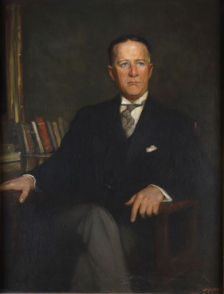Episode Nineteen: John Rockefeller Jr.
Episode Nineteen, Part X
Number 26: John Rockefeller Jr.
Party: Republican
43 years old, from Ohio
The Election of 1920
By 1920, the United States was experience a domestic age of tolerance and peace like none since the Era of Good Feelings (1815-1830s). Although President Rockefeller and the Republican Party and its progressive allies had achieved great domestic victories, not only under his administration but the preceding administration under Theodore Roosevelt, there was still an unsettling feeling towards him and his liberal internationalism that many felt was a danger to American sovereignty. It was here that many in the progressive movement had broken with Rockefeller, as progressive nationalists and conservatives came together to defeat the US entry into the League.
It was this old battle scar that would become the catalyst for the elections of 1920. The Republicans were seen, despite some of the strongest opposition coming from within the Republican Party, as the party that was willing to sell out American sovereignty to foreign collusion. Although Rockefeller remained somewhat popular, particularly for his stances on religious ecumenism (having nominated several Catholics for high ranking government positions), and his support for prohibition, his image on international foreign policy issues was forever tainted.
All the major contenders for the party nominations had to make their positions clear on the still hot-topic of international rule and internationalism as a foreign policy. Among the likely contending nominees, only Republican Senator Chase Osborn of Michigan came out as a strong supporter of the League and of internationalism as a new cornerstone in American foreign policy.
Republican Return to Normalcy
At New York, where the Republicans met to select their next nominee, the major favorites included Senators Henry Cabot Lodge, William Edgar Borah, and Governor Hiram Johnson. The Republicans were convinced that to continue their electoral dominance, they needed to drop internationalism as part of the party platform. Although they endorsed the prevailing spirit of progressivism that had come to dominate the party’s domestic policies, the Republicans repudiated Rockefeller and even Roosevelt for their internationalist stances. In a crushing nomination victory on the second ballot, with 773 of the 984 delegate votes, the Republicans nominated Senator Henry Cabot Lodge and with unanimous support for Vice President, selected Senator William Edgar Borah.
The Republican nomination couldn’t be clearer, a full rejection of Rockefeller’s League and liberal internationalist philosophy, but a full endorsement of the progressive tradition in the Republican Party. The two poster faces of the Irreconcilables, and the two most important Senators in defeating the League in the Senate sent a strong message to the voting public. Senator Borah even called the ticket he was part of, “A ticket to return America to normalcy.” However, not all Republicans were happy with the ticket. Robert La Follette, former governor of Wisconsin and a leading leftwing progressive voice walked out with fellow governor of California Hiram Johnson. Both men claimed that Lodge was too conservative on economic and business issues, just like Rockefeller and Roosevelt, and wanted to promote a more progressive economic platform. La Follette and Johnson would come to accept the Progressive Christian Party’s nomination, running on a more leftist agenda on economics – sometimes coming off as possible socialists with their policy ideas and positions.
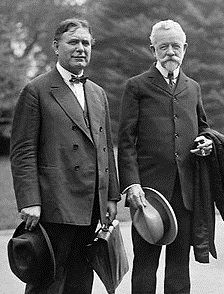
Senators Lodge and Borah, two of the leading opponents against the League of Nations, now the Republican nominees for President and Vice President respectively.
A Dark Horse Wins the Democratic Nomination
Coming into the Democratic nomination in Chicago, the Democrats were still split between the direction of their party. Southern Democrats still constituted the backbone of the party, and were very conservative on social issues, opposed the League of Nations, but were generally supportive of economic progressivism. Northern Democrats, who held the money in the party, were split between the more progressive internationalists who had supported the League of Nations and the more conservative anti-imperialists, who were skeptical of encroaching international governance and responsibility and were staunch nationalists.
In addition, one of the major contenders was a Catholic. While the Democrats had nominated Governor Burke in 1912, his Catholicism was largely hidden during the election. However, Governor Smith was the most high profile Catholic in the Democratic Party. A young and fresh face with who was a champion of immigrants, the working-class, women’s suffrage as a member of the New York House of Representatives, and one of the few high profile politicians who opposed prohibition, he was seen as the ideal candidate to lead the party forward and offer a different candidate than that of the Republican Party. However, Democratic nationalists from the South had formed behind Thomas Gore, not willing to see another “Papist” be nominated by the Democratic Party.
Woodrow Wilson and a dashing young house representative from New York – Franklin Roosevelt, were among Smith’s biggest supporters at the Convention. While Thomas Gore secured a plurality of delegates through the first 8 rounds of voting, the 9th round saw a major shift in the Democratic Party. Although Smith had been a quiet supporter of the League of Nations, he never came out publically like Wilson. Wilson’s endorsement was seen as a detriment to his cause, but Wilson and Roosevelt (who also was supportive of the League) rallied the internationalists to back Smith’s nomination in the 9th round of voting. Al Smith secured the nomination by 3 votes over Thomas Gore. Franklin Roosevelt was the surprise nomination for Vice President, having arrived at the delegation only a lowly member of the New York House of Representatives, but his display and handling of backroom politics made him an instant political star.
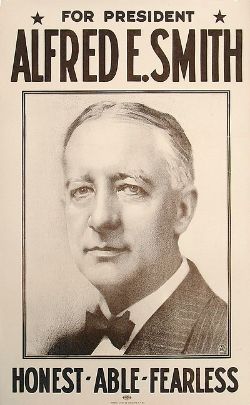
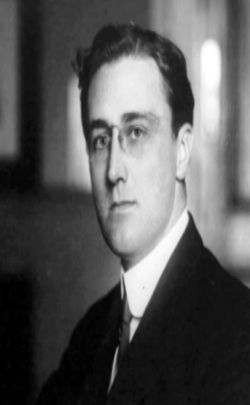
Alfred E. Smith, left, Governor of New York and the Democratic nominee for President. At right, Franklin Roosevelt, a member of the New York House of Representatives; for his political abilities at the convention, he was nominated as Vice President and seen as a young rising star in the Democratic Party.
Al Smith Wins the Election
The election cycle was brutal. Protestant nationalists attacked the nomination of Al Smith, and even some of the more conservative elements in the Democratic South threatened to bolt the party with Smith’s nomination, rather than voting for a “dirty Catholic” they would support a Yankee from Massachusetts, at least Lodge was a Protestant in their thinking. Some were openly endorsing Robert La Follette, even though he had been a former Republican.
Al Smith played down the Catholic card saying, “Governor Burke was Catholic and he was nominated. William Rosecrans, who became President after the unfortunate death of President Lincoln was Catholic…I just happen to be a Catholic who is running as the Democratic nominee for the Presidency… I am a patriotic American, who loves his country more than the glistening residence of the Vatican. Like all Catholics in America, I am an American first, and a Catholic second.”
Smith ran as a moderate on economic issues, and promised to bring the American economy into a new golden age. He was generally silent on foreign policy issues, simply saying he agreed with Rockefeller’s military reduction initiatives and that if elected, he would continue them. When questioned about the League of Nations, he simply replied, “That ship has sailed.”
Lodge also ran as a moderate on economic issues, but was very vocal in his opposition for the League of Nations. As mentioned, La Follette ran on an economic populist creed while also being vocally opposed to the League of Nations. By the election, one newspaper reporter said, “Lodge and La Follette are banking everything on an issue that died in 1918. Smith is the only candidate not living in the past but the present.”
Al Smith and the Democratic Party sailed to a great victory in 1920, and he became the first elected Catholic President of the United States.
Senate: 104 seats
Senate Majority: Democrats, 53 seats (+9)
Senate Minority: Republicans, 40 seats (-10)
Third Party: Progressives, 9 seats (+1)
Fourth Party: Socialists, 2 seats (No change)
House of Representatives: 446 seats
House Majority: Democrats, 229 seats (+30)
House Minority: Republicans, 193 seats (-32)
Third Party: Progressives, 24 seats (+3)
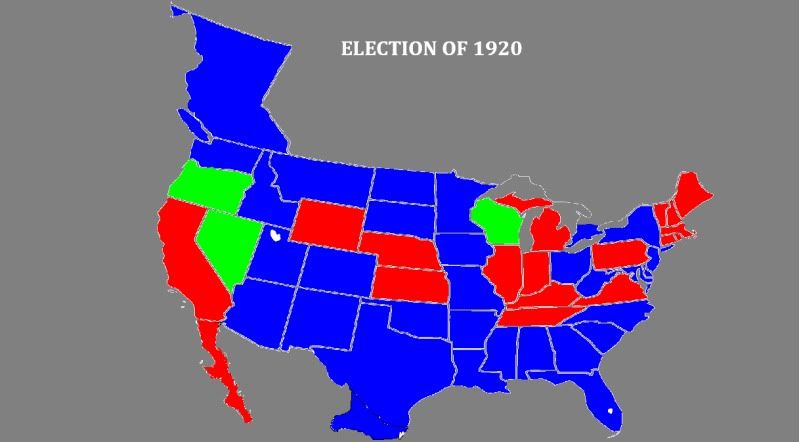
Smith/Roosevelt (D): 321 electoral votes, 31 states carried, 13,001,491 popular votes (45.3%)
Lodge/Borah (R): 205 electoral votes, 18 states carried, 11,671,813 popular votes (40.7%)
La Follette/Johnson (PCP): 21 electoral votes, 3 states carried, 3,116,813 popular votes (10.9%)
Others: 0 electoral votes, 0 states carried, 903,001 popular votes (3.1%)
Episode Nineteen, Part X
Number 26: John Rockefeller Jr.
Party: Republican
43 years old, from Ohio
The Election of 1920
By 1920, the United States was experience a domestic age of tolerance and peace like none since the Era of Good Feelings (1815-1830s). Although President Rockefeller and the Republican Party and its progressive allies had achieved great domestic victories, not only under his administration but the preceding administration under Theodore Roosevelt, there was still an unsettling feeling towards him and his liberal internationalism that many felt was a danger to American sovereignty. It was here that many in the progressive movement had broken with Rockefeller, as progressive nationalists and conservatives came together to defeat the US entry into the League.
It was this old battle scar that would become the catalyst for the elections of 1920. The Republicans were seen, despite some of the strongest opposition coming from within the Republican Party, as the party that was willing to sell out American sovereignty to foreign collusion. Although Rockefeller remained somewhat popular, particularly for his stances on religious ecumenism (having nominated several Catholics for high ranking government positions), and his support for prohibition, his image on international foreign policy issues was forever tainted.
All the major contenders for the party nominations had to make their positions clear on the still hot-topic of international rule and internationalism as a foreign policy. Among the likely contending nominees, only Republican Senator Chase Osborn of Michigan came out as a strong supporter of the League and of internationalism as a new cornerstone in American foreign policy.
Republican Return to Normalcy
At New York, where the Republicans met to select their next nominee, the major favorites included Senators Henry Cabot Lodge, William Edgar Borah, and Governor Hiram Johnson. The Republicans were convinced that to continue their electoral dominance, they needed to drop internationalism as part of the party platform. Although they endorsed the prevailing spirit of progressivism that had come to dominate the party’s domestic policies, the Republicans repudiated Rockefeller and even Roosevelt for their internationalist stances. In a crushing nomination victory on the second ballot, with 773 of the 984 delegate votes, the Republicans nominated Senator Henry Cabot Lodge and with unanimous support for Vice President, selected Senator William Edgar Borah.
The Republican nomination couldn’t be clearer, a full rejection of Rockefeller’s League and liberal internationalist philosophy, but a full endorsement of the progressive tradition in the Republican Party. The two poster faces of the Irreconcilables, and the two most important Senators in defeating the League in the Senate sent a strong message to the voting public. Senator Borah even called the ticket he was part of, “A ticket to return America to normalcy.” However, not all Republicans were happy with the ticket. Robert La Follette, former governor of Wisconsin and a leading leftwing progressive voice walked out with fellow governor of California Hiram Johnson. Both men claimed that Lodge was too conservative on economic and business issues, just like Rockefeller and Roosevelt, and wanted to promote a more progressive economic platform. La Follette and Johnson would come to accept the Progressive Christian Party’s nomination, running on a more leftist agenda on economics – sometimes coming off as possible socialists with their policy ideas and positions.

Senators Lodge and Borah, two of the leading opponents against the League of Nations, now the Republican nominees for President and Vice President respectively.
A Dark Horse Wins the Democratic Nomination
Coming into the Democratic nomination in Chicago, the Democrats were still split between the direction of their party. Southern Democrats still constituted the backbone of the party, and were very conservative on social issues, opposed the League of Nations, but were generally supportive of economic progressivism. Northern Democrats, who held the money in the party, were split between the more progressive internationalists who had supported the League of Nations and the more conservative anti-imperialists, who were skeptical of encroaching international governance and responsibility and were staunch nationalists.
In addition, one of the major contenders was a Catholic. While the Democrats had nominated Governor Burke in 1912, his Catholicism was largely hidden during the election. However, Governor Smith was the most high profile Catholic in the Democratic Party. A young and fresh face with who was a champion of immigrants, the working-class, women’s suffrage as a member of the New York House of Representatives, and one of the few high profile politicians who opposed prohibition, he was seen as the ideal candidate to lead the party forward and offer a different candidate than that of the Republican Party. However, Democratic nationalists from the South had formed behind Thomas Gore, not willing to see another “Papist” be nominated by the Democratic Party.
Woodrow Wilson and a dashing young house representative from New York – Franklin Roosevelt, were among Smith’s biggest supporters at the Convention. While Thomas Gore secured a plurality of delegates through the first 8 rounds of voting, the 9th round saw a major shift in the Democratic Party. Although Smith had been a quiet supporter of the League of Nations, he never came out publically like Wilson. Wilson’s endorsement was seen as a detriment to his cause, but Wilson and Roosevelt (who also was supportive of the League) rallied the internationalists to back Smith’s nomination in the 9th round of voting. Al Smith secured the nomination by 3 votes over Thomas Gore. Franklin Roosevelt was the surprise nomination for Vice President, having arrived at the delegation only a lowly member of the New York House of Representatives, but his display and handling of backroom politics made him an instant political star.


Alfred E. Smith, left, Governor of New York and the Democratic nominee for President. At right, Franklin Roosevelt, a member of the New York House of Representatives; for his political abilities at the convention, he was nominated as Vice President and seen as a young rising star in the Democratic Party.
Al Smith Wins the Election
The election cycle was brutal. Protestant nationalists attacked the nomination of Al Smith, and even some of the more conservative elements in the Democratic South threatened to bolt the party with Smith’s nomination, rather than voting for a “dirty Catholic” they would support a Yankee from Massachusetts, at least Lodge was a Protestant in their thinking. Some were openly endorsing Robert La Follette, even though he had been a former Republican.
Al Smith played down the Catholic card saying, “Governor Burke was Catholic and he was nominated. William Rosecrans, who became President after the unfortunate death of President Lincoln was Catholic…I just happen to be a Catholic who is running as the Democratic nominee for the Presidency… I am a patriotic American, who loves his country more than the glistening residence of the Vatican. Like all Catholics in America, I am an American first, and a Catholic second.”
Smith ran as a moderate on economic issues, and promised to bring the American economy into a new golden age. He was generally silent on foreign policy issues, simply saying he agreed with Rockefeller’s military reduction initiatives and that if elected, he would continue them. When questioned about the League of Nations, he simply replied, “That ship has sailed.”
Lodge also ran as a moderate on economic issues, but was very vocal in his opposition for the League of Nations. As mentioned, La Follette ran on an economic populist creed while also being vocally opposed to the League of Nations. By the election, one newspaper reporter said, “Lodge and La Follette are banking everything on an issue that died in 1918. Smith is the only candidate not living in the past but the present.”
Al Smith and the Democratic Party sailed to a great victory in 1920, and he became the first elected Catholic President of the United States.
Senate: 104 seats
Senate Majority: Democrats, 53 seats (+9)
Senate Minority: Republicans, 40 seats (-10)
Third Party: Progressives, 9 seats (+1)
Fourth Party: Socialists, 2 seats (No change)
House of Representatives: 446 seats
House Majority: Democrats, 229 seats (+30)
House Minority: Republicans, 193 seats (-32)
Third Party: Progressives, 24 seats (+3)

Smith/Roosevelt (D): 321 electoral votes, 31 states carried, 13,001,491 popular votes (45.3%)
Lodge/Borah (R): 205 electoral votes, 18 states carried, 11,671,813 popular votes (40.7%)
La Follette/Johnson (PCP): 21 electoral votes, 3 states carried, 3,116,813 popular votes (10.9%)
Others: 0 electoral votes, 0 states carried, 903,001 popular votes (3.1%)


